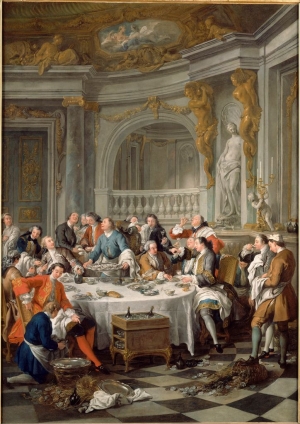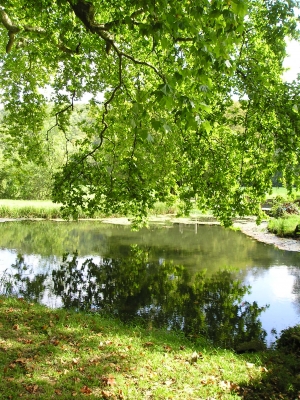Items filtered by date: May 2019
From Voltaire to Thiériot, 3 November 1735
We have the Marquis Algarotti with us [at Cirey], a young man who knows the language and morals of every country, who writes poetry like Ariosto, and knows his Locke and Newton. He reads us dialogues that he has written on the interesting parts of philosophy. Even I have undertaken my little course in metaphysics, because it behoves one to take account of the things in this world.
We’ve been reading stanzas of Jeanne la Pucelle [Voltaire’s risqué satire on Joan of Arc], or else one of my tragedies, or a chapter of The Century of Louis XIV. From there we’ve come back to Newton and Locke—not without champagne and excellent meals, because we’re very voluptuous philosophers; and if not, we’d be quite unworthy of you and your delightful Pollion.
So there’s a pretty exact account of my present life. And that’s why I'm not with you, my dear Thiériot. But be assured that life is the sweeter to me because I know how agreeable yours is to you. My happiness sends its very best regards to yours. Pay court to your charming benefactor on my behalf.
With our friend, drink health to me
In champagne whose vivacity
Sparkles as brightly as his mind;
Whilst here at our suppers refined
I drink with sublime Émilie
To you in ambrosia divine.
Image: Le Déjeuner d’Huitres, the Oyster Lunch. In this painting of the period one sees that champagne is drunk from coupe-shaped glasses. Note the airborne stopper after a servant cuts the pack-thread that held it to the bottle neck.
From Émilie to Count Algarotti, October 1735
It’s only fair, monsieur, that since I’ve just come searching for you in Paris, you should come and do the same for me. It would be very remiss of you to leave for the North Pole [Algarotti considered joining Maupertuis on his expedition] without making a visit to the Champagne, and my constant hope is that you’re incapable of doing me such a bad turn.
You’ll find my château still unfinished, but I hope you’ll be happy with your accommodation and especially with the pleasure it will give me to welcome you. Voltaire, who shares that pleasure, and who longs for your coming with the eagerness inspired by your friendship, is getting ready to sing your polar exploits in verse: you can tune your instruments together … My library is attractive enough. Voltaire’s is full of narratives, mine is all natural philosophy. I’m learning Italian for your visit, but the labourers in wood and weave make it very difficult. I’m busier than a state minister and a great deal less anxious; which is pretty much what one needs to be happy. Your company will greatly enhance the charms of my solitude. Please come, monsieur, and be assured of the extreme pleasure it will give me to welcome you.
The image shows the little river flowing through the village of Cirey-sur-Blaise.
From Émilie to the Duc de Richelieu, October 1735
I’d begun my letter intending to give you a long list of all the dangers you’d face on coming here [to Cirey]: being poorly housed, finding a hundred labourers in the place—in the end, being poorly received, if ‘poorly’ is what you feel when you’re urgently awaited with the tenderest friendship. But here I am mentioning it all again, and I imagine you’ll forgive me for the messy organisation of my colony. Voltaire says I’m just like Dido—or an ant …
You can well believe that if love hadn’t called me here, I’d have stayed in Paris. But amongst everyone I know, yours is the only company I wish for. Just being with your friend is enough to put me off other men; so you can judge what his love does to me. I’m sending you a letter [in verse] that he wrote to a Venetian, Count Algarotti—I couldn’t resist it. I might have sent it to you as President of the Academy of Sciences but I much prefer sending it to you as my intimate friend. Only a few days pass here without Voltaire writing a few little stanzas, not to mention whole narratives: I’m thinking of making up an Emiliana of all his poetry from Cirey; it would form a lovely collection. Come and see us, then—what are you doing under canvas [on the Rhineland campaign] in weather like this? I very much hope they’re not going to start sending you on new forays. They’ve sent the battle sergeants off; I’d much rather know the date when you leave yourself.
Voltaire on plagiarism: to the Marquis de Caumont, August 1735
So, monsieur, you’ve found in the letters of the late Madame d’Uxelles some particulars that you think might be useful to me? I beg you to believe that everything is of use to me; things that appear indifferent to others may serve to characterise the century that I’m examining [V. was writing The Century of Louis XIV]. For example, the decree in council that freed from prison all the unfortunate people detained for witchcraft is much more important to me than a battle—because battles are fought throughout history, whereas the mentality of peoples, their tastes, their stupidities, have not always been the same. An error erased, an art invented or perfected, seems to me far superior to the glory of massacres and destruction.
I share your view, monsieur, of The Life of Turenne [a famous French general]. I don’t despise the historian and I admire the hero. It’s true that the Life didn’t interest me but on the other hand it contains several quite well-written passages. The work shows us an intellect that is cold, but brought on by reading good authors. The only thing that annoys me is that he’s like those weak stomachs that bring things up in the same state as they swallowed them. I’ll allow him imitation, since he’s a foreigner, but not plagiarism. He’s a Scot who’s made a lot of money in France, but he shouldn’t be stealing from people.
As for the hero, I still say that he changed his religion either out of weakness or because it was in his interests. For I refuse to believe it was from conviction. Right up to his death he had mistresses who laughed at him; at the head of armies he betrayed his king; he told a state secret to a young woman; he lost five or six battles; given all that, I think he’s one of the greatest men we’ve ever had.
Image: Turenne, 1611-1675



